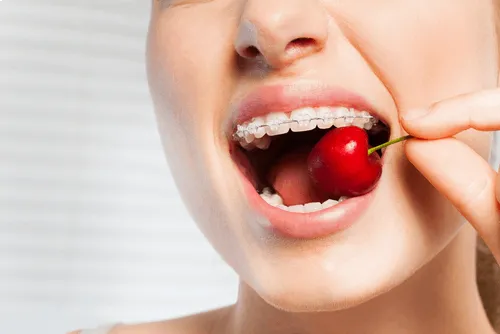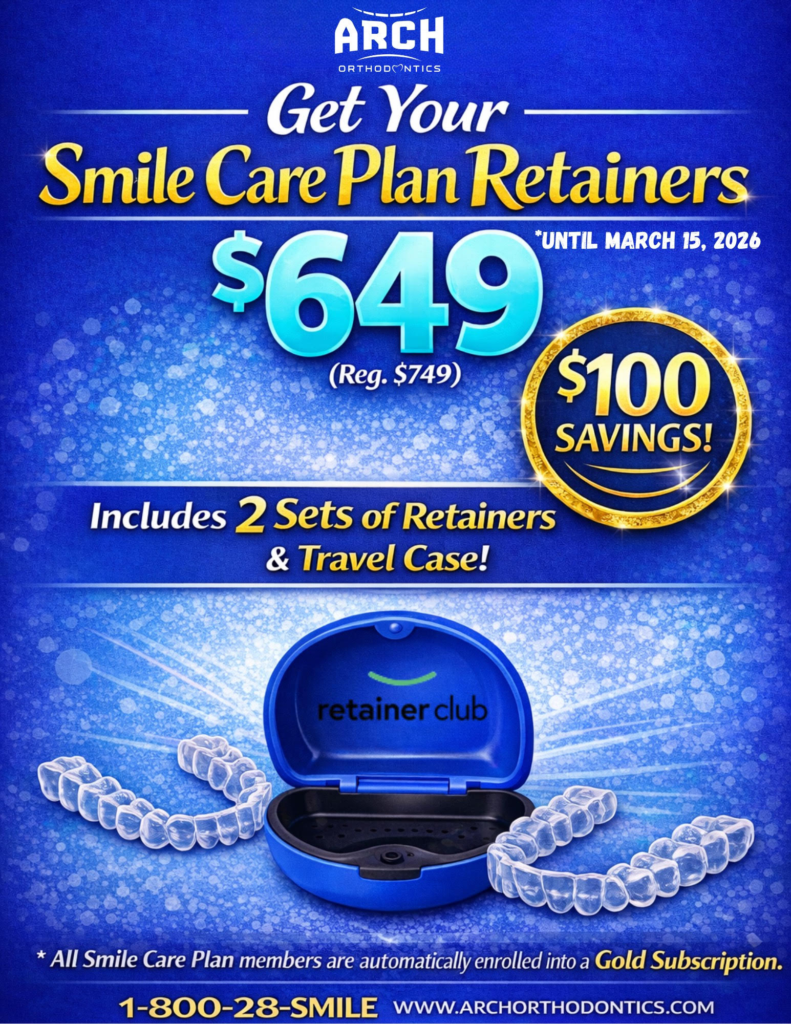Braces are an exciting step toward achieving a healthier, more confident smile. But along with the responsibility of keeping your teeth clean, you’ll also need to adjust your eating habits. Some foods can damage braces or make cleaning more difficult, while others can actually support your orthodontic progress and overall dental health.
If you or your child is starting orthodontic treatment, here’s a guide to the foods you can and can’t eat with braces.
Why Food Choices Matter With Braces
Braces are designed to gently guide teeth into proper alignment over time. While sturdy, they aren’t indestructible. Eating the wrong foods can:
- Bend or break brackets and wires — which may delay treatment progress
- Increase the risk of cavities — because certain foods are harder to clean around brackets
- Cause discomfort — sticky or hard textures can pull at brackets or irritate gums
By choosing foods carefully, you’ll protect your braces and keep your treatment on track.
Foods You Can Eat With Braces
The best foods for people with braces are those that are soft, easy to chew, and less likely to get stuck in wires or brackets. Here are some orthodontist-approved options:
- Dairy products — Yogurt, soft cheeses, and milk are gentle on teeth and provide calcium to strengthen enamel.
- Soft fruits — Bananas, berries, kiwis, and melons are nutritious and easy to chew. Apples and pears are fine when cut into small pieces.
- Cooked vegetables — Steamed carrots, squash, broccoli, and spinach are braces-friendly once softened.
- Protein sources — Tender chicken, meatballs, lunch meats, and fish provide protein without damaging braces.
- Grains and pasta — Rice, noodles, soft bread, and pancakes are all safe and easy to manage.
- Soft treats — Pudding, applesauce, smoothies, and ice cream (without crunchy toppings) can be enjoyed in moderation.
During the early days after getting braces—or after adjustments—cold or soft foods like smoothies, mashed potatoes, or soup can also help ease soreness.
Foods to Avoid With Braces
Certain foods can break wires, loosen brackets, or stick in hard-to-reach places. While you won’t have to avoid them forever, steering clear of these options during treatment will save you from unnecessary repairs and delays:
- Hard foods — Nuts, popcorn kernels, hard candies, and ice can break brackets or wires.
- Sticky foods — Caramel, chewing gum, and gummy candies can get stuck and be nearly impossible to clean.
- Crunchy snacks — Pretzels, chips, and raw carrots can damage braces unless softened or cut into small pieces.
- Chewy bread products — Bagels and crusty rolls can strain brackets and wires.
- Whole raw fruits and veggies — Apples, corn on the cob, and raw carrots are risky unless cut into bite-sized pieces.
- Sugary treats — Soda, sports drinks, and candy increase the risk of cavities and staining around brackets.
Braces-Friendly Substitutions
The good news? You don’t have to give up your favorite flavors—you just need to prepare them differently.
- Craving crunchy vegetables? — Steam or roast carrots and broccoli instead of eating them raw.
- Love apples and pears? — Slice them into small, bite-sized pieces.
- Missing popcorn? — Try puffed corn snacks or softer alternatives that won’t damage braces.
- Want something sweet? — Choose yogurt with fruit, soft muffins, or smoothies instead of sticky candy.
These small adjustments can help you enjoy a varied diet without compromising your orthodontic treatment.
Tips for Eating With Braces
Beyond choosing the right foods, how you eat them matters. These tips can help protect your braces and make meals more comfortable:
- Cut food into smaller pieces — This makes chewing easier and reduces the risk of damaging brackets.
- Chew with your back teeth — Avoid biting into hard or chewy foods with your front teeth.
- Rinse after meals — Swishing with water helps loosen food particles that can cling to braces.
- Brush and floss regularly — Consistent hygiene prevents plaque buildup around brackets and wires.
- Use orthodontic tools — Products like floss threaders or water flossers can make cleaning easier.
Why Good Food Choices Are Important
Sticking to braces-safe foods isn’t just about protecting your hardware. It also helps:
- Prevent delays in treatment — Damaged wires or brackets may extend overall treatment time.
- Protect oral health — A braces-friendly diet reduces the risk of decay and gum issues.
- Make treatment more comfortable — Softer foods are gentler when teeth feel sore.
- Support overall wellness — A balanced diet provides the nutrients your teeth and gums need to stay strong during orthodontic treatment.
By staying mindful of your diet, you’re not just protecting your braces—you’re ensuring your smile transformation stays on track.
Enjoying Life With Braces
Getting braces doesn’t mean giving up every food you love. With a little creativity and planning, you can still enjoy a wide variety of meals and snacks. Focus on foods that are easy to chew, avoid those that could cause damage, and remember that these dietary changes are temporary.
When your braces come off, you’ll not only have a healthier smile but also a greater appreciation for the progress you made along the way. If you’re looking for guidance on braces in the Bridgewater, MA area—or need a personalized plan for orthodontic care—ARCH Orthodontics can help. Schedule your free consultation today and take the first step toward a smile that lasts a lifetime.

